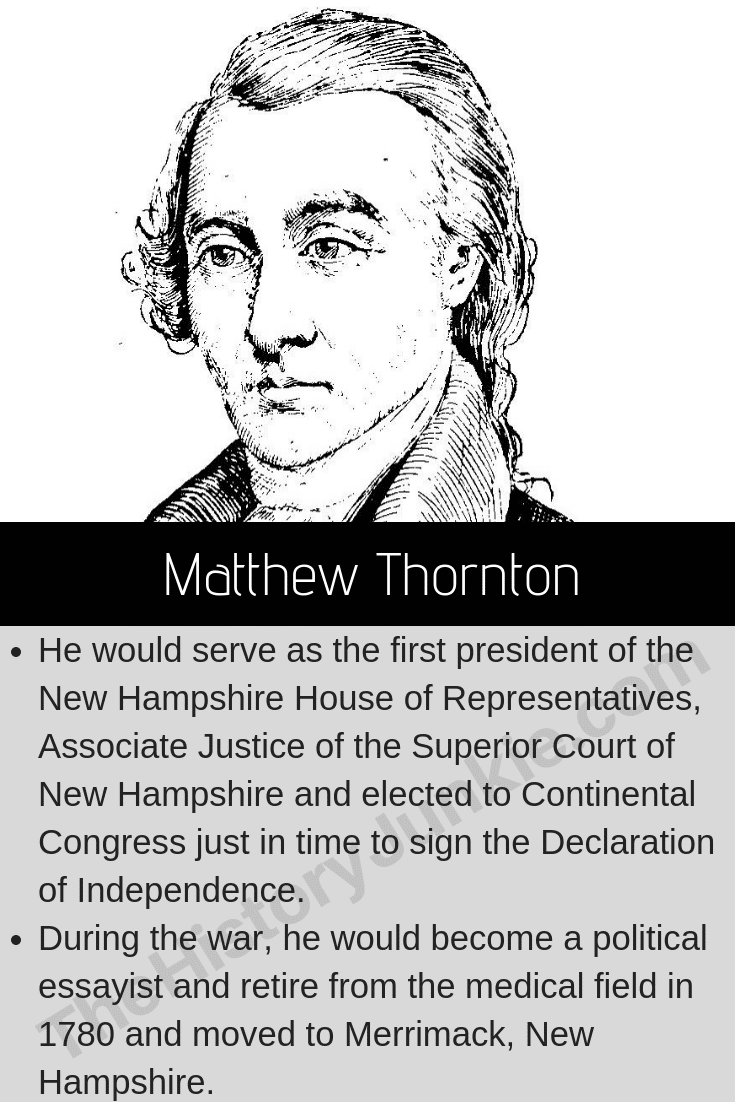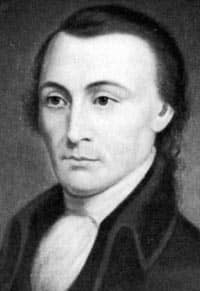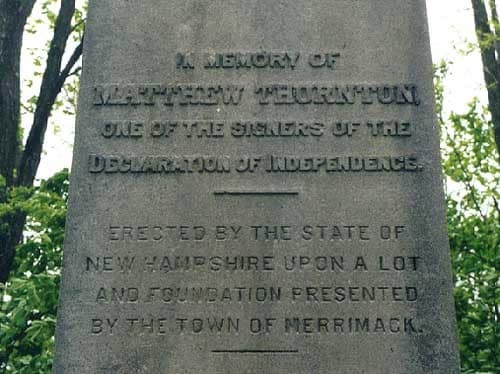Thornton was born in Ireland and was three years of age when his family immigrated over to the American colonies, settling in Maine at first and then quickly moved to Massachusetts Bay Colony.

He would later move to New Hampshire, where he would become a physician and be appointed physician over the New Hampshire militia. He was elected as a New Hampshire delegate to the Second Continental Congress.
He would serve alongside Josiah Bartlett and William Whipple.

Political Career
Thornton, like many of the Declaration of Independence Signers, would serve in multiple government vocations before and after the Second Continental Congress.
He would serve as the first president of the New Hampshire House of Representatives, Associate Justice of the Superior Court of New Hampshire, and was elected to the Continental Congress just in time to sign the Declaration of Independence.
He would also become a Londonderry Town Selectman, a representative and President of the Provincial Assembly, a member of the committee of safety, and helped draft New Hampshire's form of government after it declared Independence from Britain.
The New Hampshire Constitution would become the first constitution after the hostilities with England began.
American Revolution
During the war, he would become a political essayist, retire from the medical field in 1780, and move to Merrimack, New Hampshire.
Here, he would run a ferry with his family until his death in 1803.
Matthew Thornton was known for his hard work ethic, multiple abilities, and his honesty.
He was known as a man of character, which one sees when one looks at his gravestone that reads, "An Honest Man." He was a devoted Christian and a devoted father.

Legacy
Charles Goodrich said this about Thornton in his book The Lives of the Signers of the Declaration of Independence:
The powers of Dr. Thornton's mind continued unusually vigorous to a late period of his life.
After he was eighty years of age, he wrote political essays for the newspapers, and about this period of life, prepared for the press a metaphysical work, comprised of seventy-three manuscript pages in quarto, and entitled, "Paradise Lost; or, the Origin of the Evil called Sin, examined; or how it ever did, or ever can come to pass, that a creature should or could do anything unfit or improper for that creature to do," &c.
This work was never published, but those who have had access to the manuscript pronounce it a very singular production.
It is not a little remarkable that, although a physician and consequently often exposed to the whooping cough, he did not take that disease until he had passed his eightieth year.
Although at this time enfeebled by years, he survived the attack and even continued his medical practice.
In stature, Dr. Thornton exceeded six feet in height, but he was remarkably well-formed.
His complexion was dark. and his eyes were black and piercing. His aspect was uncommonly grave, especially for one who was naturally given to good humour and hilarity.
Dr. Thornton died while on a visit at Newburyport, Massachusetts, on the 24th of June, 1803, in the 89th year of his age.
In the funeral sermon by Rev. Dr. Burnap, we are furnished with the following sketch.
"He was venerable for his age, and skill in his profession, and for the several very important and honourable offices he had sustained; noted for the knowledge he had acquired, and his quick penetration into matters of abstruse speculation; exemplary for his regard for the public institutions of religion, and for his constancy in attending the public worship, where he trod the courts of the house of God, with steps tottering with age arid infirmity. Such is a brief outline of one who was honoured in his day and generation, whose virtues were a model for imitation, and while memory does her office, will be had in grateful recollection."
